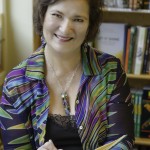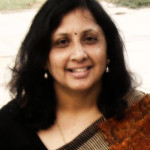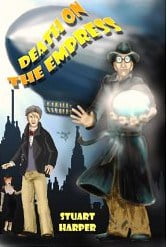Not long after the release of his debut YA novel, British author Stuart Harper made an exciting discovery that made him reconsider his definitions of what spells self-publishing success. His experience, shared on ALLi's private Facebook forum this morning, instantly struck a chord with other indie author members around the world, who have also given permission to be quoted here. It also chimed with Lucienne Boyce‘s post earlier this week asserting that the real value of author events lies in making connections with readers.
 Stuart Harper, British YA novelist:
Stuart Harper, British YA novelist:
“I launched my debut YA novel Death on the Empress less than a month ago, and in my very short time as a self-published writer, my proudest moment was when I discovered that a class in Australia was using my book, Death on The Empress, in their lessons. They were studying the character descriptions in the book and drawing what they thought the characters looked like. (Click here to see their pictures on the school's website.) This made me realise what I really wanted to get out of writing.
“When I decided to go down the route of self-publishing, I didn’t really have in my head the number of copies I wanted to sell. What was respectable? 10, 100, 1000? Because I never really had a figure in my head, I didn’t know whether to judge myself as a success or not.
“It was only when I saw all those children, on the opposite side of the world, reading Death on The Empress and drawing the characters from my book that I realised that sales figures aren’t important to me. It’s knowing that there are people who I don’t know, who I will never meet, who I will possibly never be in the same hemisphere as, who are enjoying my book, drawing the characters and talking about the story. Even if I never sell another book (and I’m realistic that I probably won’t shift too many more), I will consider this launch a success.”
Views from Other ALLi Authors
 Carol Cram, a Canadian author whose debut historical novel The Towers of Tuscany, was officially launched last Sunday:
Carol Cram, a Canadian author whose debut historical novel The Towers of Tuscany, was officially launched last Sunday:
“While I will measure success by sales and profits, of course, I agree that the true measure of success is that people are reading the book and getting something out of it. I used to think that being successful meant getting a publisher. As soon as I realized that true success was writing a book I could be truly proud of and then putting it out to the world so people could read and enjoy it, all the pieces of the publishing puzzle just fell into place. I just launched my novel to a packed audience and it was the best feeling in the world!”
 Rasana Atreya, bestselling Indian self-published novelist:
Rasana Atreya, bestselling Indian self-published novelist:
“Success is getting fan mail from Mexico and Ukraine and Pakistan. I love that women there could relate to a book that is set in rural India!”
How do you judge your success as a self-published author? Average rating? Number of Reviews? Free downloads? Sales figures? Please do tell, via the comments box!
To make it easy to share this inspiring post with other indie authors, here's our suggested tweet:
Authors, how do you judge your #selfpub success? An inspiring take on the subject from a debut author here: http://wp.me/p44e6Y-1Jl





[…] If you’re an indie author, how do you know if you’re successful? Here’s some advice about that. […]
I’m torn.
Like Joanna, I’d love to make a good living on my writing, but like John, connecting to readers is important to me. Obviously, I’d like to do both, as per Charles Dickens, but the first is much more measurable than the second, and I don’t believe that success has to be quantified.
On the other hand, I do believe you have to eat, and that too many writers and artists are afraid of financial success instead of actively seeking it out.
My definition of success as an author is absolutely bound up in money and number of books sold. If I was just writing for my own creative expression, I wouldn’t be publishing or trying to reach readers with my work. I have boxes of journals that will never see the light of day, but my published works are absolutely intended to sell and please millions of readers.
I was brought up by a single Mum and as a woman, financial independence has always been of primary importance to me. I got my first job at 14, and being able to pay my own way is critical to my sense of self-esteem as well as actually paying for my life. I would never have given up my day job as a business consultant to become a full time author-entrepreneur unless this had been a viable business. And we are lucky that in 2014, it IS a viable business – but only if you take it seriously AS a business.
This IS my job, as well as my passion. I don’t have another source of income, I am not retired.
ALLi is a community where authors with many different goals can find a home, and calling business-minded authors ‘hacks’ is not exactly inclusive or constructive. I see the indie eco-system as a place where you can write and publish what you consider ‘good,’ and we accept the person who sells a few copies to family as much as the people who sell hundreds of thousands, as well as millions of books. My definition of success is in the latter category – but I don’t consider myself any less of a creative because of my commercial focus.
In fact, I WANT to be incredibly financially successful in order to show my nieces and nephews that being a full time creative is a viable future for them – and that they don’t just have to get an office job as I did at 22 – which then took me 13 years to escape.
For any author who has an issue with others earning good money from writing, I would point you at a couple of books:
* Show Your Work – by Austin Kleon – which has a whole section on reframing ‘selling out’ and why you should do it
* Make Art Make Money: Lessons from Jim Henson on Fueling Your Creative Career – Elizabeth Stevens (who I will be interviewing on my podcast later this year)
I agree with Joanna for all of the reasons listed above. I like writing, but do it as a means to help afford the things I’d like for my family. With the first of three kids going to college this year, I had to do something, as my ‘day job’ paid me just enough that he wouldn’t get any tuition assistance, yet not enough for me to be able to send him to school. As the book sales have now climbed above what I make in my day job, I am faced with which to retain as my full-time employment (and it is a nice choice to have). I have a thick skin, so you can call me a ‘hack’ if you will, but enough people have enjoyed my books that it is fun to continue to write them. We could also debate the meaning of hack-ism, but I would submit that when enough people like your writing, at some point you go from ‘hack’ status to ‘favorite author,’ regardless of your grammar, word usage and how fast you can turn out a book. I am very happy with the commercial success I have had, and am happy that Joanna has turned her success into a viable industry. Good for her.
Speaking of which, I also wanted to say “thank you” to Joanna, as my success has been due in a large part to the tools and advice available on her web site. Thank you, Joanna. Keep up the good work.
I do think it’s also perfectly valid to have commercial goals, though, and to define success in that way. Actually, I believe that creative and commercial are inherently intertwined and I’m not sure that setting creative and commercial in opposition to each other does us any favours as self-publishers. After all, a writer who is widely read is a writer who has created, and been sheltered in, a lot of universes. Who is doing *something* very right.
I think that’s very well put. It’s quite possible to have commercial success without sacrificing creative satisfaction–one’s inherent style and intent can be crafted into something the public wants to read, or at least finds readable. It takes a lot of work, and a lot of self-awareness, to be humble enough to learn the craft and to understand the potential readership. Doing so doesn’t guarantee commercial success, of course, but hopefully increases the likelihood of it!
Thanks for this comment, Orna. I was thinking the same thing.
Completely by chance, since I put up this post yesterday, I’ve received a new review for my e-book, “Coming To Terms With Type 1 Diabetes: One Family’s Story of Life After Diagnosis”, which certainly counts as a success story in my eyes. Both my husband and my daughter have this serious, chronic, incurable illness, and I wrote the book to share our experience, in the hope that it might help other families cope better when they are diagnosed. It is also raising funds for research into a cure, via the charity JDRF, to whom I’m donating all the proceeds of the e-book. This is what the review says:
“Thank you Debbie for writing this book! My 10 year old son was diagnosed with type1 diabetes 6 months ago and with Coeliac disease 4 months ago. It has been a huge ( and frightening) learning curve for us all but with the fantastic resources and support from JDRF and people like yourself, it has certainly helped us along the way. I continually live in hope for a cure for this disease.”
If my book has made life easier for just one family – and actually there are a lot more reviews like this – then my book has been a success. Encouraged by such reviews, I’m now working on adding new material and turning it into a paperback to launch on World Diabetes Day in November.
http://authordebbieyoung.com/non-fiction/type-1-diabetes/
Great stories – and I’m sure they’re true stories, if that’s not an oxymoron. They’re also heart-warming confessions, told with a certain amount of justifiable pride. Just to add to the mix, here is my story, quite the contrary to those published above:
I began writing fiction seriously in the 1970s when my children were very young and I read them the usual bedtime stories. One, based on my WW2 experiences as an evacuee centred on a conflict between suspicious Devonshire locals and aggressive Cockney intruders. The peacemaker was Henry, an eight=year old Londoner based on myself who like me had Devonshire relatives with whom he stayed during the Blitz on London. My lids loved it and insisted on hearing the next episode. Hence my first novel.
Despite glowing reports the novel was never published. After a couple of years I lost interest. I continued to write fiction and have since published 6 novels. Again ‘despite glowing reports’ I know of nobody beyond friends who have bought a single copy of any of them. So, I’ve written millions of words, spend thousands of hours and thousands of pounds on promotion and still have not sold more than a handful of books.
Does it stop me writing? Of course not. I’m a debutante octogenarian, now frantically reading other people’s work and reviewing others who might have been ‘unjustly neglected.’ In financial terms I’m a dead loss, yet I’m still working on another novel and a grammar book for students.
Would you post a link to your books, David? I’d love to check them out.
That’s a great story! I can’t emulate it … yet.
My personal definition of self-publishing success will be when people who’ve bought (or borrowed!) my book on managing personal debt start sending me messages saying it got them out of a hole. That would make me feel the effort was worthwhile; although I’ve had a fair number of favourable reviews, they’ve mostly been from people who don’t have a debt problem.
So in effect I echo the last sentence of Philippa Rees’s post.
PS I originally posted this reply on the Facebook group page. At the time I didn’t include the book link; but I am assured that doesn’t contravene ALLi etiquette, so here it is:
http://www.amazon.co.uk/Back-Black-debt-free-Telling-Experience-ebook/dp/B004PLMAQM
Today was the day to ask myself this question. First off I received an amazing comment on my blog (related to the’ingredients’ of what is stirred into a book- in my case non-fiction but poetic and speculative) next was a complete stranger posting a link to an interview I did on a website/ezine, and then a message on facebook saying the above had spurred him to buy the book, which was his start on a new journey he’s been waiting for.
I have sold very few copies, but despite the work being nominated for two awards, nothing came close to the delight of knowing it had ignited a real fire in three people. My day has been nothing but celebration of readers who ‘got’ what I was after giving! Hallelujah! My ONLY measure of success was making some difference to somebody.
The first sense of success was having a finished novel–one that was not only created, but crafted and ready to publish.
The second sense of success was getting it self-published digitally–I’ve self-published non-fiction, but a novel means so much more to me deep inside. It felt as if I’d lived up to a promise I’d made to myself in my youth.
The third sense of success was getting a few sales, then nearly 1500 downloads in two days during a free promotion, and modest but steady sales since it was published five weeks ago.
The fourth sense of success was getting good reviews and people saying they wanted to see more, endorsements from established authors, and making the long list for a contest.
The fifth sense of success was holding the proof copy of the print edition of the book–it just blew me away.
The sixth sense of success is working on the next book in my series, this time knowing for certain I can do it and that there’s people out there already invested in my heroine, Charlotte, and her story–the world of my novel isn’t just in my head anymore. It’s such a lovely feeling.
The seventh level of success will be the most elusive–earning enough to live on while I write the next book, and the one after that, etc. But I’m not complaining. I write in good faith, and have lived long enough to know that things like that tend to sort themselves out.
My first self published book was The River People, a middle grade (classical) Native American story. My daughter was around 8 when she read it, and then I found her playing “The River People” with her Barbies in her room. She made them “weaved cedar clothing” and cardboard longhouses. It doesn’t get much better than that!
I’ve had several school groups read the book together, and talked to a class online once about this book. It was kind of a one-off project for me, too, because I mainly write romance. But I’ve gone to talk to groups of students about being an author, and one high schooler did a job shadow with me. Those kinds of things are an amazing experience for me. There’s lots of ways to measure success: good reviews, sales, relationships, and just the awesome feeling of writing a book and liking it myself. While I was writing my family drama/ romance Point Hope, I just knew. It was a good story, and I was proud of it before anyone else even read it.
As somebody who has been self-publishing since 1986 – albeit in the corporate market – and has recently switched to fiction, I’d say that only a hack writes for money alone. (And yes, we could name a lot of indie hacks who are outputting unreadable novels every three weeks!) Fiction authors write to create a universe for their readers to live in. Then the readers create a universe for the author to live in. Leastwise, that’s why – in my retirement – I’m now writing fiction. When a reader emails me to say ‘I loved your last story’, I feel my own universe expand..Or is that too mystical?
That’s a beautiful description of the author/reader relationship.
I love your universe expand comment, John, and totally resonate with it. We work very hard to write the best novel we can write and then we give it to the world in the hopes that readers will get even a portion of the benefit we got from writing it. I wrote the novel I wanted to read; it’s pretty cool that other people want to read it too! The more we expand the universe with the best writing we can offer, the better off we all are.
Thanks, Carol. Perhaps another way of explaining why we write is that we want to write something that, in our dotage, we’d like to read ourselves. Again and again. Ego-centric? Yes. But I make no apologies for it 🙂
I started writing a novel when I realised that the stuff I was reading was nearly perfect but not quite. And the only way to get my perfect novel, was to write it myself.
It turns out that, the story I created was nearly perfect (for me), but not quite.
I made enough money from the first novel (after paying the cover artist) for a couple of very nice evenings out. But the real payback, is when somebody comes up to me, or emails or tweets and says “I read your book and I enjoyed it.”
Not mystical, fact! But how beautifully you put it, John. “What oft was thought but ne’er so well expressed”, as our friend Mr Pope has it! I’ll be using (stealing!) your definition methinks… 🙂